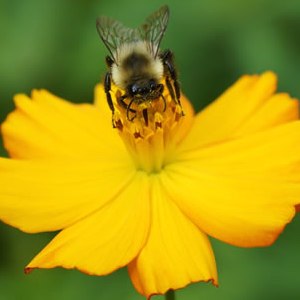
A provincial government decision to reduce the use of pesticides has agriculture producers and bee keepers buzzing.
OXFORD COUNTY - A provincial government move to dramatically reduce the use of a pesticide that is killing bees in Ontario, has created a buzz across the province.
The pesticide known as neonicotinoids is widely used in Ontario agriculture production especially for corn and soybean, two major crops grown in Ontario.
Grain Farmers of Ontario say the pesticide is important for developing plants like corn. The seeds are coated in neonicotinoids to protect the developing plant from insects. Director of the Grain Farmers of Ontario Oxford and Waterloo district Kevin Armstrong says without the pesticide treated seeds crop yields will plummet.
"The potential is (if using seeds not treated with neonics) for lower yields of our crops in a time when we are fighting low commodity prices, but we're also fighting adverse weather conditions this year, in a time when everything seems more and more problematic...this reduces our competitive edge with our neighbours to the south but also the rest of Canada."
In a Grain Farmers of Ontario press release, the Conference Board of Canada estimates farmers will lose up to $630 million annually if they are forced to reduce the number of acres planted with neonicotinoid-treated corn and soybean seed by 80 percent.
The pesticide in question has been banned by the European Union. According to one UK biologist who specializes in the conservation of bees the neonicotinoids are 5,000 times worse than DDT. It is unclear if the neonics have any kind of impact on human health. However, Canadian Pest Management Regulatory Agency findings have discovered a link between bee deaths and the use of neonic-treated soybean and corn seeds.
Bees and other pollinators are vital to Ontario agriculture productivity. Pollinators help crops such as apples, peaches, cucumbers, pumpkins and melons to grow. A provincial government report estimates that pollinators including bees are responsible for pollinating crops worth $897 million or roughly 13 percent of agricultural crops in Ontario.
David Baird Vice-President of the Ingersoll District Nature Club is running a Pollination Awareness Week. Baird says he thinks the provincial government announcement is a mix of good news and uncertainty. "This particular plan to cut by 80 percent-- we have until 2017 to do that-- is several years away...and in terms of the continued use of this pesticide is still a big problem."
LAWSUIT
The provincial government announcement of the pesticide reduction and the findings of the Canadian Pest Management Regulatory Agency have strengthened a national class action lawsuit filed by Canadian Bee Keepers. Last September CBK launched a lawsuit against manufacturers of the neonicotinoid pesticide Bayer and Syngenta for $400 million in damages for the negative economic effect the pesticide has had on bee colonies. In the claim statement the Canadian Bee Keepers say their businesses have suffered significant financial blows due to the cost of replacing dead bees, reduced honey production, the inability to perform contracted pollination services and more.
Canadian Bee Keepers have retained Siskinds lawyer Dimitri Lascaris who says the provincial government announcement to establish a comprehensive Pollinator Health Action Plan and reduce neonicotinoid use by 80 percent over the course of two years is a good sign moving forward. "It would indirectly affect it (the lawsuit), it would be fair to say in a positive manner, because the action taken by the Ontario government support is entirely consistent with the position being taken in the litigation by the plaintiffs that these pesticides are causing very substantial harm to bees."



 UPDATE: Collision on Norwich Ave Cleared
UPDATE: Collision on Norwich Ave Cleared
 Woodstock Dragon Boat Fest Returns
Woodstock Dragon Boat Fest Returns
 Privacy Incident at Woodstock Hospital
Privacy Incident at Woodstock Hospital
 Charges Laid in Ingersoll Drug Bust
Charges Laid in Ingersoll Drug Bust
 Opening Ceremony for Paris Olympics Today
Opening Ceremony for Paris Olympics Today
 UPDATE: Pizza Fest Results Revealed
UPDATE: Pizza Fest Results Revealed
 Woodstock Issues Scam Warning
Woodstock Issues Scam Warning
 Local Group Looks to Save Woodstock Aquatics Facilities
Local Group Looks to Save Woodstock Aquatics Facilities
 UPDATE: Motorcyclist Killed in Zorra Crash
UPDATE: Motorcyclist Killed in Zorra Crash
 Mountain Bike Stolen in Delhi
Mountain Bike Stolen in Delhi
 Drowning Prevention Tips from Local Lifesavers
Drowning Prevention Tips from Local Lifesavers
 Registration Opens for Woodstock Christmas Tour
Registration Opens for Woodstock Christmas Tour
 Operation Sharing Welcomes New Executive Director
Operation Sharing Welcomes New Executive Director
 Bank of Canada Cuts Interest Rate
Bank of Canada Cuts Interest Rate
 Community Grant Applications Open in Zorra
Community Grant Applications Open in Zorra
 Kayaker Rescued in Beachville
Kayaker Rescued in Beachville
 Mischief in Woodstock Leads to Charges
Mischief in Woodstock Leads to Charges
 Woodstonian Busted for Impaired Driving
Woodstonian Busted for Impaired Driving
 Operation Sharing Looking for Donations
Operation Sharing Looking for Donations
 Running with the Bulls Raises Over $15,000
Running with the Bulls Raises Over $15,000



Comments
Add a comment